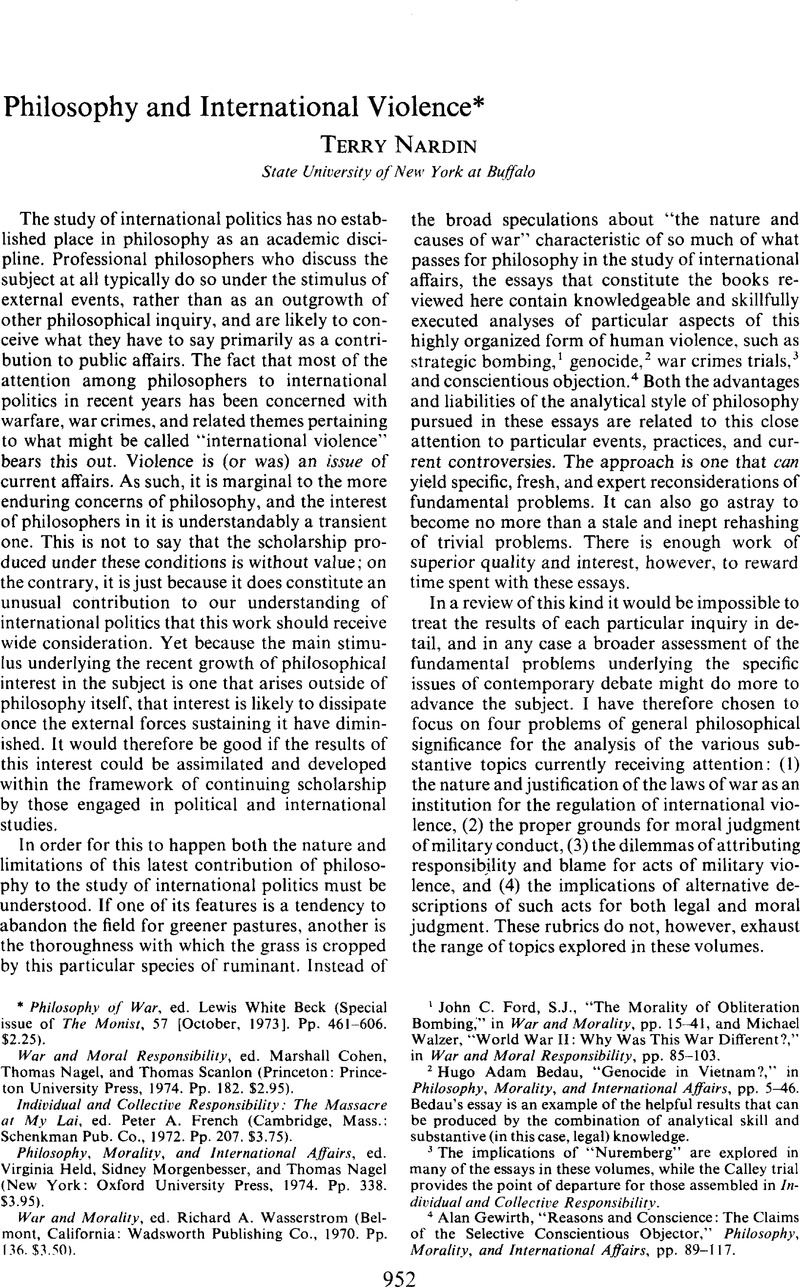No CrossRef data available.
Article contents
Philosophy and International Violence
Review products
Published online by Cambridge University Press: 01 August 2014
Abstract

- Type
- Book Reviews and Essays
- Information
- Copyright
- Copyright © American Political Science Association 1976
References
1 Ford, John C. S.J., “The Morality of Obliteration Bombing,” in War and Morality, pp. 15–41Google Scholar, and Walzer, Michael, “World War II: Why Was This War Different?,” in War and Moral Responsibility, pp. 85–103Google Scholar.
2 Bedau, Hugo Adam, “Genocide in Vietnam?,” in Philosophy, Morality, and International Affairs, pp. 5–46Google Scholar. Bedau's essay is an example of the helpful results that can be produced by the combination of analytical skill and substantive (in this case, legal) knowledge.
3 The implications of “Nuremberg” are explored in many of the essays in these volumes, while the Calley trial provides the point of departure for those assembled in Individual and Collective Responsibility.
4 Gewirth, Alan, “Reasons and Conscience: The Claims of the Selective Conscientious Objector,” Philosophy, Morality, and International Affairs, pp. 89–117Google Scholar.
5 “Toward Reconstructing the Jus Ad Bellum,” in Philosophy of War, pp. 461–488.
6 “War and Murder,” in War and Morality, pp. 43–44.
7 “The Relevance of Nuremberg,” in War and Moral Responsibility, pp. 134–158.
8 Ibid., p. 158. The point is developed by Wasserstrom in a second essay: “The Responsibility of the Individual for War Crimes,” in Philosophy, Morality, and International Affairs, pp. 47–70. Cf. Levinson, Sanford in “Responsibility for Crimes of War,” in War and Moral Responsibility, p. 109Google Scholar; “It would be better to focus clearly on the morality of warfare and to speak unequivocally of moral condemnation than to pretend that the category of ‘war crimes’ or ‘war criminals’ is meaningful.”
9 Cohen, Marshall, “Morality and the Laws of War,” in Philosophy, Morality, and International Affairs, p. 86Google Scholar.
10 “War and Massacre,” in War and Moral Responsibility, p. 23.
11 “The Killing of the Innocent,” in Philosophy of War, p. 536.
12 “Utilitarianism and the Rules of War,” in War and Moral Responsibility, pp. 46–61.
13 Especially Hare's, R. M. “Rules of War and Moral Reasoning,” in War and Moral Responsibility, pp. 46–61Google Scholar.
14 “Political Action: The Problem of Dirty Hands,” in War and Moral Responsibility, pp. 62–82. Walzer distinguishes this attitude toward the problem of doing evil that good may come of it from two others: the Machiavellian, which despite its rhetoric of paradox actually disposes of the problem by deciding that the end justifies the means, and the Weberian, according to which to act politically becomes the vocation of those who accept the necessity of doing evil and suffering guilt for the sake of others.
15 French, Peter A., “Morally Blaming Whole Populations,” in Philosophy, Morality, and International Affairs, p. 273Google Scholar.
16 See the volume of essays on this topic edited by Peter A. French, Individual and Collective Responsibility, as well as his essay cited above.
17 Fain, Haskell, “Some Moral Infirmities of Justice,” in Individual and Collective Responsibility, p. 32Google Scholar.
18 Held, Virginia, “Moral Responsibility and Collective Action,” in Individual and Collective Responsibility, p. 115Google Scholar.
19 This problem is explicitly considered by two contributors to Philosophy, Morality, and International Affairs: Margolis, Joseph, “War and Ideology,” pp. 246–265Google Scholar, and Nielsen, Kai, “Social Science and American Foreign Policy,” pp. 286–319Google Scholar. It is, however, implicit in each of the controversies we have examined, as I hope will soon become apparent.
20 See the essays by Ford, Anscombe, Nagel, and Murphy already cited.
21 An exception is Morgenbesser, Sidney, “Imperialism: Some Preliminary Distinctions,” in Philosophy, Morality, and International Affairs, pp. 201–245Google Scholar.



Comments
No Comments have been published for this article.